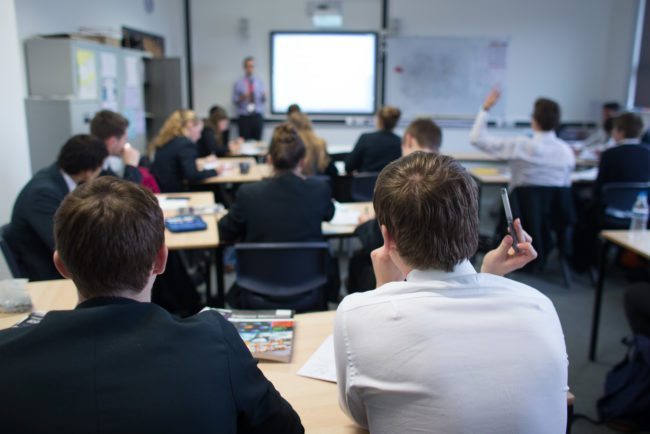Only one in five schools in Northern Ireland educate on LGB issues

Just one in five schools in Northern Ireland are educating their children on LGB issues, with only one in eight educating their pupils on trans issues.
In the damning Department of Education report, only 21.4% of schools said that they did cover LGB issues in their relationships and sex education, even though sex education is a statutory part of the Northern Irish curriculum.
Another 59% of schools said they did not cover LGB issues within their teaching.

A British classroom (Matt Cardy/Getty Images)
Only 21% of the schools surveyed said that they did cover LGB issues.
Another 19% said they would prefer not to answer the question.
“The results of this survey make for depressing reading. Teaching about LGBT issues isn’t just about ensuring that schools are equally inclusive of LGBT pupils as they are of other pupils, it’s about promoting understanding and fostering respect between all pupils,”
said Northern Ireland Humanists Development Officer Boyd Sleator.
But you can’t do either of those things if you simply ignore that LGBT pupils exist, which is evidently what the majority of schools in Northern Ireland are doing,” he added.
Another 69% of teachers surveyed said they were not aware of pupils who identify as LGB having attended their school.
“The Northern Ireland Government must make clear that this approach is entirely unacceptable and move immediately to provide the training that schools and teachers need to fulfil their duty of care,” Sleator added.
On the back of this report, the Council for Curriculum, Examinations and Assessment said that a diverse relationships and sexuality education can “help raise the self-esteem of young people who may feel differently.”
“Schools should handle the issue of sexual orientation and gender identity in a sensitive, non-confrontational and reassuring way,” it recommended.
“In the primary setting, schools can do this very effectively by teaching about the difference in Relationships and Sexuality Education (RSE).”
“Relationships and sexuality education can help provide a positive view of sexual orientation and gender identity which, in turn, can help raise the self-esteem of young people who may feel differently.”
A total of 424 schools were involved in the survey, of which 310 were primary schools, 91 post-primary schools and 23 were special schools.
Northern Ireland’s track record on LGBT rights is still sorely in disrepute.
Northern Ireland is the only nation in the UK that does not allow same-sex marriage.

